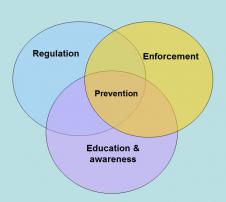
Dutch local alcohol policy
Integrated local alcohol policy
Alcohol related problems are most visible in local communities: accidents, public drunkenness, criminality and delinquency, domestic violence, alcohol intoxications and addictions. This is why these problems are best addressed in the local setting.
Local alcohol policy should be characterized by an active long term cooperation between policy makers with different specializations and local stakeholders from various organizations. Active and open support from the mayor, aldermen and the city council is of great importance. A clear analysis and communication of the local alcohol related problems is a powerful tool to create awareness of the need for action and to get the support of the city administration and stakeholders. In the short-term, visible results of policy can be accomplished by publishing the results. However, really establishing local alcohol policy and getting tangible lasting results demands a long-term approach and therefore everyone needs to support the long-term strategy.

Three policy pillars
There are three essential pillars of effective preventive local alcohol policy:
(1) regulation;
(2) enforcement;
(3) education and awareness.
WHO rating shows that measures that correspond to the policy pillars ‘regulation’ and ‘enforcement’ belong to the most effective. Educational measures alone are not effective in changing behavior. However, education and awareness are important for creating support.
1. Regulation
For elaboration of the pillar 'regulation' most Dutch municipalities use their powers under the Alcohol Act (Alcoholwet) and the Municipalities Act (Gemeentewet).
Mayor
The mayor implements the Alcohol Act at a local level in co-administration. He grants the licences to liquor stores and catering venues. Most licensing terms are regulated nationally (see theme page Dutch Alcohol Policy). The mayor can grant dispensations for special events (King's Day, carnival) for a maximum of 12 days. The holder of such a dispensation can serve mildly alcoholic beverages outside a catering venue.
The mayor can also grant exemptions from:
- the serving times of canteens, also for a maximum of 12 days, and
- the floor-space requirement of catering areas in monumental buildings.
City councils
City councils have the competence to complement the national rules in local ordinances. Some regulatory powers:
- To ban (temporarily) alcohol sales in liquor stores, pubs/restaurants;
- To put special requirements on licences;
- To limit licences to light alcoholic beverages;
- To ban temporarily alcohol sales by grocery stores, snack bars and beer couriers;
- To determine an access age to pubs/restaurants (≤ 21 years) (also after a certain point in time);
- To determine that an ID check is required for access to pubs/restaurants;
- To prohibit extreme price promotions (happy hours) in the catering industry (> 40%);
- To set higher floor space requirements for pubs/restaurants and liquor stores (minimum is 35m² for pubs/restaurants and 15m² for liquor stores);
- To allow liquor stores to organize courses and tastings outside opening hours;
- To designate alcohol nuisance areas and take appropriate measures;
- To require that commercial providers on boats and other means of transport have a Certificate Responsible Serving.
Furthermore, the Alcohol Act obliges municipalities to adopt an 'Ordinance on semi-commercial venues', to regulate alcohol serving hours in sport clubs and canteens in churches and community centers. These ordinances often include other local rules to combat unfair competition with the regular commercial catering industry.
Most municipalities have also alcohol related rules in their General Local Ordinance. For example:
- Opening and closing hours of pubs and restaurants and late evening shopping hours;
- Regulations of terraces (for example: no outdoor beer taps);
- Local operating licences for pubs and restaurants;
- Alcohol advertising in public space;
- A ban of drinking alcohol in public in a specific area within the municipality.
Many city councils impose their local additional rules in one ‘Alcohol Ordinance’ or in a separate chapter of the General Local Ordinance. Since 2014, municipalities must also periodically draw up a Prevention and Enforcement Plan.
Effective policy measures
An international group of leading scientists, sponsored by the WHO, has published a rating list of the effectiveness of policy relevant strategies and interventions (Babor et all, 2010). In the table below we have selected those interventions that are most relevant for the local policy strategy.
Table: Effectiveness rating alcohol policy measures
| Policy measure | Effectiveness | Breadth of research |
|---|---|---|
| Raising the price | +++ | +++ |
| Ban on sales | +++ | +++ |
| Minimum purchasing age | +++ | +++ |
| Restrictions days and hours of sale | ++ | ++ |
| Lower density of sale points | ++ | +++ |
| Enhances enforcement of sale points | ++ | ++ |
| Restrictions on alcohol marketing | +/++ | +++ |
| Responsible beverage service (staff training) | 0/+ | *** |
Source: Babor et all (2010) Alcohol, no ordinary commodity. Oxford University Press.
2. Enforcement
1 January 2013 the pillar 'enforcement' has become important for municipalities. At that moment the enforcement of the Alcohol Licensing and Catering Act (the predecessor of the Alcohol Act) came at the local level in the hands of specially enforcement officials (‘boas’) appointed by the mayors.
The enforcement officials of the Netherlands Food and Consumer Product Safety Authority have a number of national enforcement tasks. They ensure the compliance with the rules on alcohol serving in passenger transport, at military sites, at airports (after customs) and by the itinerant trade. They also enforce the rules about alcohol online orders and the ban on exorbitant price promotions in the retail sector.
Besides these two groups of special alcohol supervisors “normal” police officers can act because they have general law enforcement powers.
Penalties for alcohol providers
Both the minister and the mayor can impose an administrative fine on entrepreneurs violating the Alcohol Act and the municipal Alcohol Ordinance. The amount of the fine is fixed in the Alcohol Decree. The revenues of the fines imposed by the minister goes to the National Treasury, those of the mayors goes to their local community.
But there are more sanctions possible. The mayor may, for example, revoke licences (permanently or temporarily) of liquor stores and pubs/restaurants. He can remove visitors from illegal catering venues and close the doors. On the basis of the Municipalities Act it is also possible to impose a penalty payment or administrative coercion. The mayor and the minister can also prohibit for one to twelve weeks the sale of alcoholic drinks by grocery stores and webshops frequently violating underage purchasing regulations.
In certain cases (serious offences) the mayor and the minister can decide not to impose an administrative fine, but transfer the case to the Public Prosecutor. The case will then be dealt with according to the Economic Offences Act.
Fines for young people
Young people age 12 to 18 caught drinking or possessing alcohol on the road, in parks, festivals, camping sites, pubs and restaurants can be penalized (by ‘boas’ and the police). The fine is currently € 55 for young people below 16, and € 110 for youngsters age 16 and 17 years. Be fined has no consequences for getting a Certificate of Good Behavior.
Young people who violate the ban on public possession of alcohol, can be referred to Halt, at least if they meet certain conditions. There they participate in Halt Alcohol, an alternative sanctions programme.
Fines for onward supplying
With the new Alcohol Act, not only the alcohol seller, but also the adult who pass on alcohol to minors in places open to the public will be fined. This is called onward supplying.
Alcohol Prevention and Enforcement Plan
Since 1 January 2014 the alcohol law states that municipalities must adopt periodically (at least every four year) an Alcohol Prevention and Enforcement Plan.
This plan must include:
- The essentials of the enforcement policy;
- The objectives of the enforcement policy;
- The manner in which the enforcement policy is implemented;
- The enforcement actions that will be taken;
- The results the municipality wishes to attain in the coming years.
A survey commissioned by the Ministry of Health, Welfare and Sport, indicated that 80.4% of the municipalities adopted early 2015 an Alcohol Prevention and Enforcement Plan.
3. Education and awareness
Purpose of this policy pillar is to create a broad support for the municipal alcohol policy. It is important that the municipality also clearly communicates that the regulations are not intended to make life complicated for entrepreneurs, parents or young people, but to protect public health and safety. Ideally, both entrepreneurs and citizens are aware of the risks of alcohol use, understand the measures that have been or will be taken at the local level, and are willing to comply with the rules.
Examples education and awareness
The measures in this pillar include:
- Communication directed at entrepreneurs, (sports)associations, parents and young people
- Start up and financing local alcohol prevention projects
- Media advocacy
- Organizations of debates and study days
- Supporting civil initiatives in this field
- Promote an alcohol-free living environment for young people (especially in the education and youth work)
- Financing of training of sport canteen personnel
The pillar 'education and awareness' can also include prevention activities aimed at risk groups, thus:
- Providing information materials in places where risk groups come
- Promoting early interventions and treatment, for example in schools and primary health care
Alcohol Prevention and Enforcement Plan
In the legally-required municipal Alcohol Prevention and Enforcement Plan, the following must be included on alcohol prevention:
- The essentials of the alcohol prevention policy, particularly towards young people (here, for example, a municipality can mention sub-target groups);
- The objectives of the alcohol prevention policy;
- The prevention actions that will be taken (a municipality can decide to focus just on alcohol prevention or to have actions in conjunction with other prevention programs, including programs for health promotion).
STAP supports municipalities
Employees of STAP have knowledge of effective local alcohol policy measures. Therefore STAP can help municipalities with advice about the Alcohol Act, the Alcohol Decree and the local Alcohol Prevention and Enforcement Plan.
P.O. Box 9769
3506 GT Utrecht
The Netherlands
T: +31 (0)30-6565041
F: +31 (0)30-6565043
E: info@stap.nl